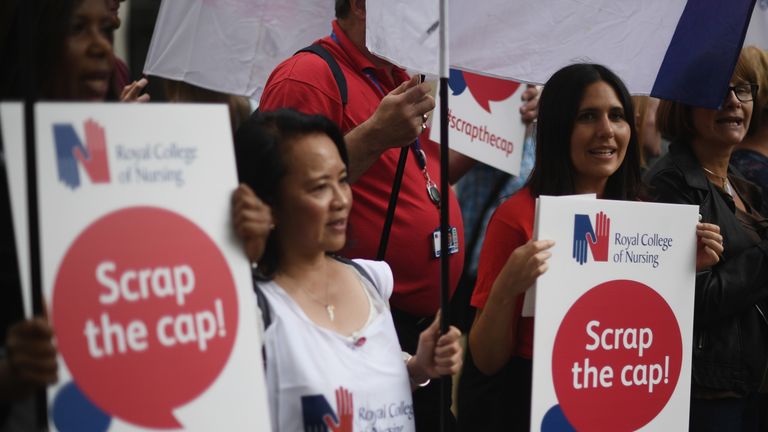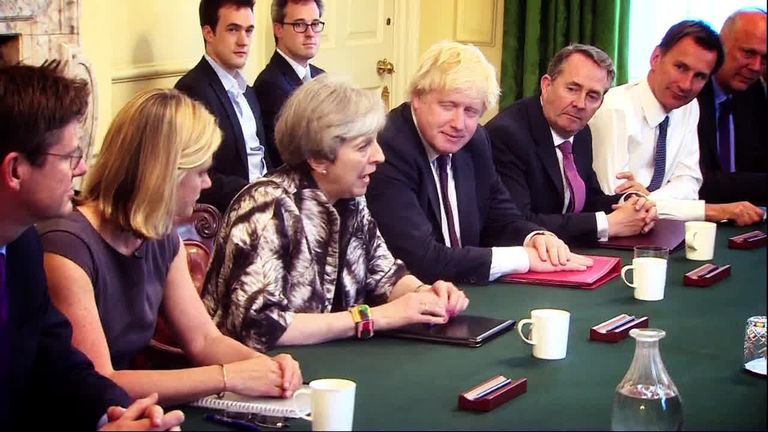Public sector pay cap 'to be lifted next year'
Theresa May and Philip Hammond are said to be looking at scrapping a pledge to keep pay rises for public sector workers below 1%.
Tuesday 5 September 2017 10:33, UK
Public sector pay is set to rise above inflation for the first time in eight years, Downing Street has signalled.
Theresa May and Philip Hammond are understood to be drawing up plans to raise the pay cap, which has limited pay rises to 1% a year since 2010.
Scrapping it for all public sector workers would cost £4bn but ministers may support a staggered approach, prioritising areas such as nursing where there are staffing shortages.
The pay of NHS staff, teachers and others in the public sector has been a subject of concern in Downing Street and the Treasury since the snap election result in June.
Ministers are due to send out letters to the independent pay review bodies within weeks, in which they can offer guidance, and are understood to be preparing to back a lifting of the cap.
It comes after pressure within the Cabinet, with Jeremy Hunt, the Health Secretary, and Justine Greening, the Education Secretary, lobbying behind the scenes for a pay rise.
Boris Johnson infuriated Downing Street by publicly throwing his weight behind calls for the cap to be lifted in July, saying public sector workers should be "getting a better deal".
Other members of Cabinet had argued against it - with Mr Hammond reportedly telling colleagues public sector workers were overpaid - but it may now feature in his first Autumn Budget.
Around 30% of public sector workers are in the NHS, and another 30% work in education. Both sectors have struggled with recruitment and retention of staff in recent years.
During a TV event before the election Mrs May was tackled by a nurse, who asked the Prime Minister why her pay had fallen by 14% in real terms. Mrs May told her there was "no magic money tree".
Asked about the reports on Monday, the Prime Minister's spokeswoman said: "We are listening. We know that many people in the public and private sector feel they are just about managing. We recognise the sacrifice that they are making, but there is a process in place and I can't pre-empt that process."
Chris Grayling, the Transport Secretary, did not play down the reports in an interview on Tuesday morning, saying such decisions would be announced at the Budget.
One plan reportedly under consideration is for the lowest-paid public sector workers in sectors struggling to recruit to have the pay cap lifted in April next year, with others to follow in 2019.
Giving higher raises to public sector workers who live in areas with steeper costs of living, which already happens in London, under so-called 'London weighting', is also said to be under consideration.
Scotland's First Minister, Nicola Sturgeon, will ratchet up the pressure as she is expected to announce today that the cap will end in Scotland next year, when she unveils her Government's legislative programme for 2017-18.
David Cameron and George Osborne announced the pay cap in 2010 and it was due to last 10 years. Union leaders welcomed the reports it may be lifted.
Rehana Azam, national secretary of the GMB union, said: "This damaging policy has seen thousands pinched from public sector workers over seven years. All public sector workers must receive proper pay rises - including those not covered by pay review bodies, such as school support staff, council workers and police staff."
Vince Cable, the Liberal Democrat leader, who was a minister in the coalition government which introduced the freeze, said: "The situation has changed since it was first introduced, at a time when there was a real budget emergency and fear of large-scale unemployment.
"The issue we face now is very different. We are struggling to recruit and retain public sector staff and the effects of this recruitment crisis are being felt across the board, from our schools to our hospitals."
Labour sought to capitalise on the Government's discomfort over public sector pay by tabling an amendment to the Queen's Speech in June, calling for the cap to be scrapped.
Tory MPs voted against it, but many subsequently expressed their concerns about it, and said they would push for it privately.





